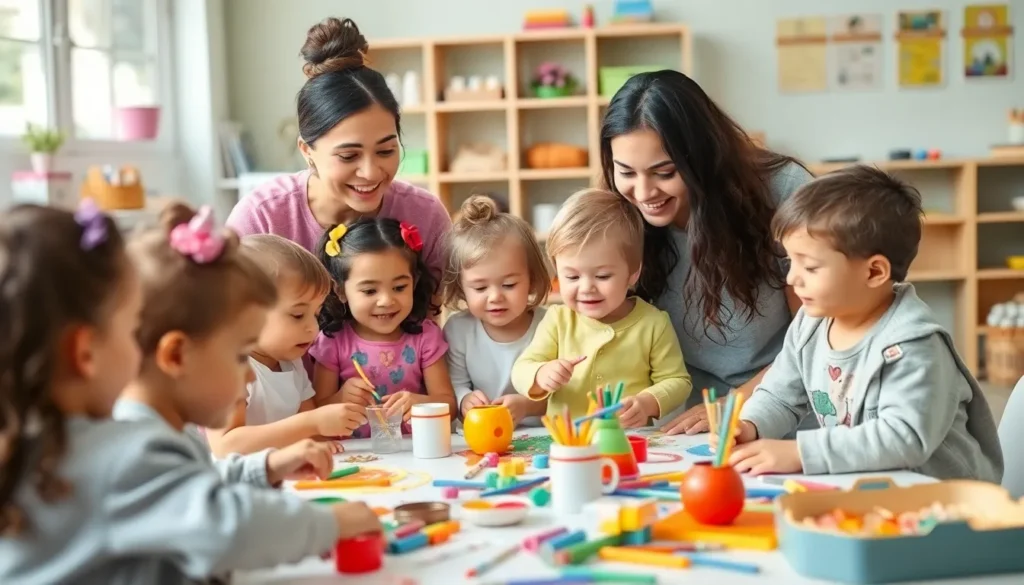Table of Contents
ToggleIn a world where toddlers can master smartphones faster than their parents, the quest for effective language development has never been more critical. Enter language playgroups—where fun meets learning in a delightful cocktail of giggles and chatter. These vibrant gatherings aren’t just about kids playing with blocks; they’re about building the foundations of communication in a way that feels like a game, not a chore.
Overview of Language Playgroups
Language playgroups offer engaging settings for toddlers to develop communication skills through interactive activities. These groups blend play and learning, nurturing language abilities in a fun environment.
Definition and Purpose
Language playgroups serve as informal settings where young children explore language through play. Designed for toddlers, these environments encourage the use of words, phrases, and simple sentences during creative activities. Playgroups aim to foster social interaction, enhance vocabulary, and support early literacy skills. Parents and caregivers play a key role by participating and modeling language use, creating a supportive backdrop for toddlers to thrive.
Benefits for Children
Participation in language playgroups contributes significantly to children’s development. Engaging in group activities boosts confidence in speaking and sharing ideas. Exposure to diverse vocabulary fosters cognitive growth and understanding of language structure. Interaction with peers nurtures social skills, such as turn-taking and cooperation. Additionally, regular attendance in these groups may lead to improved listening skills as children learn to respond to others and follow directions.
Structure of Language Playgroups

Language playgroups create a structured environment for toddlers to enhance language skills while interacting with peers. Various elements contribute to the effectiveness of these playgroups.
Typical Activities
Activities in language playgroups focus on promoting language development through playful engagement. Storytime sessions introduce children to new vocabulary. Creative arts and crafts projects encourage verbal expression through guided discussions. Singing familiar songs reinforces language patterns while enhancing memory retention. Group games, such as word scavenger hunts, stimulate curiosity about language use. Parents and facilitators both participate, modeling language in action during these engaging activities.
Group Dynamics
Group dynamics play a crucial role in the success of language playgroups. Small group sizes allow for individualized attention and promote meaningful interactions among children. Mixed-age groups foster peer learning, as older children often help younger ones grasp new concepts. Inclusive environments encourage all children to participate without fear of judgment. Facilitators guide discussions, ensuring every child feels heard and valued. Strong relationships between caregivers and facilitators contribute to a supportive atmosphere, enhancing overall language development.
Selecting the Right Language Playgroup
Finding the right language playgroup significantly influences a child’s language development. Parents and caregivers should evaluate various factors before enrolling their children in a playgroup.
Factors to Consider
Group size matters for individualized attention. Smaller groups allow for more interaction, helping children engage in conversations. Location impacts accessibility and convenience. Proximity to home can facilitate attendance. Activities offered shape the learning experience. Playgroups that incorporate storytelling, music, and hands-on activities enrich vocabulary and promote language use. Age range influences peer interaction; mixed-age groups encourage dynamic learning opportunities. Lastly, consider the group’s philosophy. A playgroup focused on inclusivity, support, and encouragement fosters a positive environment for all children.
Recommendations
Prioritize groups that emphasize interactive play. Language development thrives in stimulating settings. Look for playgroups that provide language exposure through various mediums, such as books and songs. Select groups that involve caregivers in activities. Active participation reinforces language modeling. Investigate the qualifications of facilitators; trained professionals enhance educational experiences. Observe trial sessions to gauge compatibility with values and dynamics. Additionally, ask other parents for recommendations. Personal experiences often reveal the best options tailored to individual needs.
Impact on Language Development
Language playgroups provide essential opportunities for children to enhance their language skills. Engaging in activities encourages various aspects of language growth.
Cognitive Benefits
Language playgroups support cognitive benefits by fostering critical thinking and language comprehension. Activities like storytelling stimulate imagination, enhancing the ability to process and create narratives. Children learn to categorize language concepts, which aids vocabulary expansion. Research highlights that interactive play can lead to better problem-solving skills as children explore language through games. Participation in these activities nurtures memory retention, making it easier for children to recall new words and phrases. Diverse vocabulary exposure, along with engaging interactions, directly contributes to improved cognitive abilities.
Social Skills Improvement
Language playgroups significantly improve social skills through cooperative play and interaction. Children practice sharing ideas, taking turns, and respecting others, which are vital social behaviors. Positive peer interactions foster emotional regulation, as they learn to navigate friendships and conflict resolution. Observational studies reveal that small group settings encourage more profound connections, allowing for personalized conversations. Communication in mixed-age groups provides role models, helping younger children learn language subtleties, while older children reinforce their skills. Enhanced social skills contribute to overall emotional intelligence, preparing children for future interactions in and out of educational settings.
Language playgroups offer a vibrant avenue for toddlers to develop essential communication skills in a supportive environment. These groups not only enhance vocabulary but also nurture social interactions and emotional intelligence through engaging activities. By prioritizing inclusivity and interactive play, language playgroups create spaces where children can flourish. Parents and caregivers play a crucial role in this journey, modeling language use and participating in activities that enrich learning experiences. The right playgroup can make a significant difference in a child’s language development, setting a solid foundation for future learning and social success.




